
|
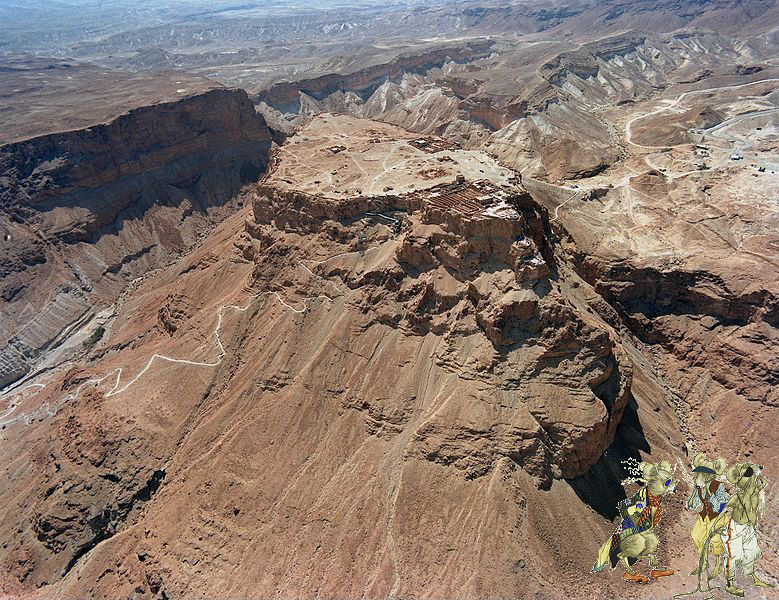
Who was more
insane ? The Zaddikim Zealots
- for mesa riding (long way to haul supplies);
or the Roman's - for building
the ramp (same for them)?
Zaddikite War on Human
Nature
morphs into a War on Nature
931 BC King Solomon dies and
the United Monarchy splits into two parts - the northern Kingdom of Israel and
the southern Kingdom of Judah.
722 Hezekiah, according to the
Mishnah, was the son of Ahaz, the
13th King of Judah.
Hezekiah enacts sweeping religious reform after
witnessing the destruction of the northern kingdom of Israel by Assyrians led
by Sargon.
These include a
strict mandate for the sole worship of Yahweh and a prohibition on
venerating other deities within Solomon's Temple.
Hezekiah purifies and
repairs Solomon's Temple in Jerusalem, purges it of
idols, reforms the
priesthood and centralizes
the worship of Yahweh.
"The key phenomenon - which cannot be
explained solely against the background of economic prosperity - was the sudden
growth of the population of Jerusalem in particular, and of Judah in general."
- Archaeologist Israel Finkelstein
Archaeologist Amihai Mazar explains,
"Jerusalem was a virtual city-state where the majority of the state's
population was concentrated."
The reign of Hezekiah saw a notable
increase in the power of the Judean state as there was a large influx of
Israelites fleeing from the
Assyrian destruction
of the northern state of Israel.
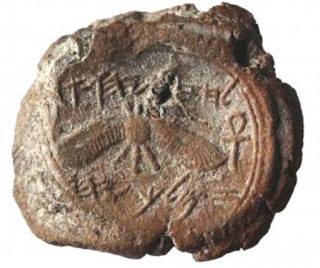
715 BC
King Hezekiah of Judah, backed by Nubian Empire, revolted against King
Sennacherib of Assyria.
Sennacherib sacks Hebrew
villages, but fails to
take Jerusalem.
Annals record a list of booty sent from Jerusalem to
Nineveh.
Hezekiah remained on his throne as a vassal ruler.
Hezekiah's capitualtion informed the later suicide at Massada by his
last remaining psychopathic Zaddikim followers.
597
BC King Nebuchadnezzar of Babylon captures Jersalem and installs
Zedekiah.
Zedekiah revolts against Babylon, and enters into an alliance
with Pharaoh Hophra, the king of Egypt.
589 BC
King Nebuchadnezzar II of Babylonia lays siege to Jerusalem.
587 BC Jerusalem falls and Solomon's Temple is
destroyed.
Talented craftsmen and the
educated are taken into captivity to Babylon.
Legend claims
Jerusalem is razed to the ground.
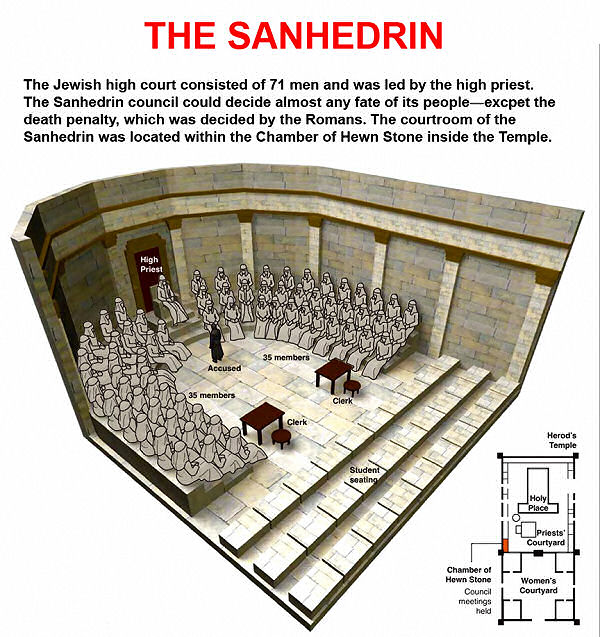
516
BC The Second Temple is constructed by Jewish
exile groups returning to Jerusalem from Babylon under the Achaemenid
Zerubbabel.
The period of the Second Temple is the creative epoch in
Jewish history.
The five centuries from the end of the Babylonian Exile
to the destruction of the Temple by the Romans in the year 70 of the present
era saw the development of almost every basic institution and the founding of
the entire literary tradition upon which Jewish life ran for the next two
thousand years.
The Synagogue, the world' first religious institution;
first regular system of exegesis based on the public reading;
translations of Septuagint make
Alexandrian Hebrew scripture
classic;
Sadducees, the Hasmonean source of Jewish sectarianism;
Essenes collect the
Dead Sea Scrolls
inspiring Christianity;
Pharisees, rabbis attempting to
keep Judaic Temple tradition intact;
development of the Oral Law creates
Talmudic culture filling Jewish
minds.
In the Second Temple period, the Great Sanhedrin met in the Hall
of Hewn Stones in the Temple in Jerusalem.
The court convened every day
except festivals and Shabbat.
Ma'aseh Merkabah revolves around
the knowledge of secret names of God used theurgically for mystical
ascent.
Like most other Hekhalot texts it begins with a conversation
between Rabbi Ishmael and Rabbi Akiva, where the latter
expounds on spiritual
mysteries.
Hekhalot literature from the Hebrew word for
"Palaces", relates to visions of
ascents into heavenly palaces.
The genre overlaps with Merkabah or
"Chariot" literature, concerning Ezekiel' chariot; together they are
"Books of the Palaces and the Chariot."
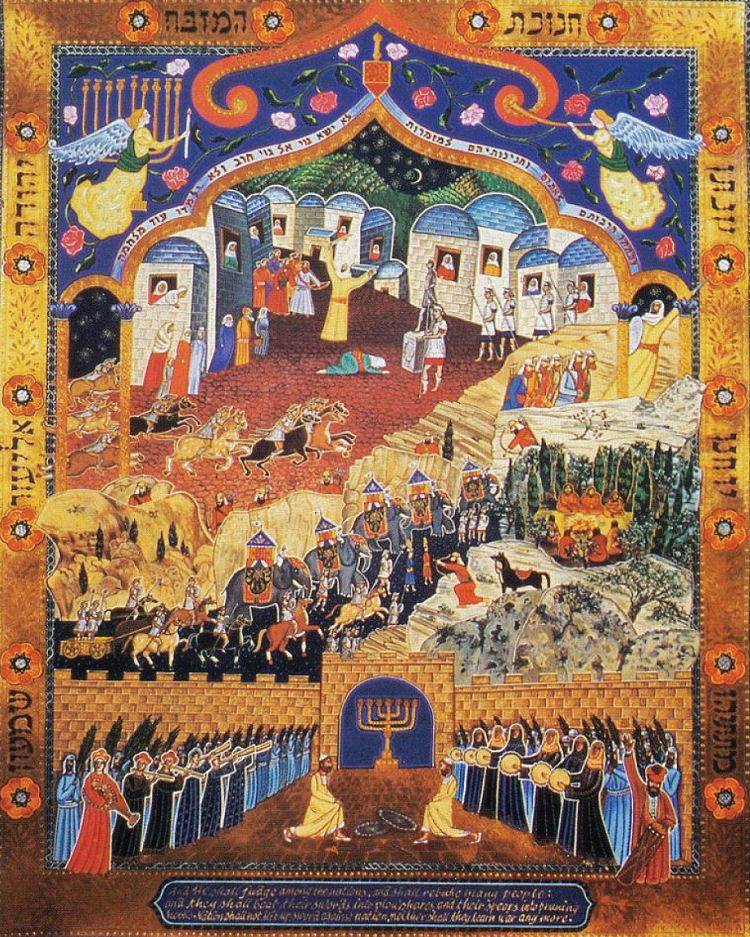
167 to
160 BC The Maccabean Revolt is led by Simon Maccabeus against the
Seleucid Empire and the Hellenistic influence on Hebrew life.
The revolt was in response
to Antiochus IV, decree to 'rent in pieces' and burn Hebrew 'books of the law'
found in Jerusalem in 168 BC.
Simon Maccabeus the leader of
a Hebrew rebel army, the Maccabees,
takes control of Judah, which is a province of the Seleucid Empire.
The Maccabees found the
Hasmonean
dynasty.
The Hasmonean dynasty asserts
their version of the Hebrew religion, largely through
forced conversion
with the help of a high priest sect, the Sadducees, to expand the
boundaries of Judah by religious conquest in the vain attempt to reduce the
influence of the Therapeutae and
Essenes.
The Hasmoneans adopt Jubilees immediately, and it
became a source for the Aramaic Levi Document.
Book of Jubilees
narrates the genesis
of angels on the 1st day of Creation.
A group of fallen angels mate
with mortal females, giving rise to a race of giants known as the Nephilim, and
then to their descendants, the Elioud.
The Ethiopian version states the
"angels" were the disobedient offspring of Seth (Deqiqa Set), while the "mortal
females" were daughters of Cain.
Clementine literature, Sextus Julius
Africanus, Ephrem the Syrian, Augustine of Hippo, John Chrysostom and early
Christian authorities agree.
Their hybrid children, the Nephilim in
existence during the time of Noah, were wiped out by the great flood.
Jubilees also states God gave a mission to ten percent of the
disembodied spirits of
the Nephilim to try to lead mankind astray after the flood.
4
classes of angels: angels of the presence, angels of sanctifications, guardian
angels over individuals, and angels presiding over the phenomena of
nature.
Enoch was
the first man initiated by the angels in the art of writing.
Jubilees bases its take on Enoch on the "Book of
Watchers", 1 Enoch 1–36.
Its sequence of events leading to the
Flood match those of the "Dream Visions", 1 Enoch
83–90.
Jubilees remained a point of reference for priestly
circles; the Temple Scroll and "Epistle of Enoch" (1 Enoch 91:1–10,
92:3–93:10, 91:11–92:2, 93:11–105:3) are based on
Jubilees.
It is the source for certain of the Testaments of the
Twelve Patriarchs.
When the Romans replaced the Seleucids as the
great power in the region, they granted the Hasmonean king, Hyrcanus II,
limited authority under the Roman governor
of Damascus.
The Hasmoneans are hostile to the Romans, and the following
years they witnessed frequent insurrections.
A last attempt to restore
the former glory of the Hasmonean dynasty was made by Mattathias Antigonus,
whose defeat and death brought Hasmonean rule to an end, and Judah became a
province of the Roman Empire.

37 BC Herod, a son-in-law of
Hyrcanus II, is appointed King of Judah by the Romans.
Granted
unlimited autonomy in the country's internal affairs, he became one of the most
powerful monarchs in the eastern part of the
Roman Empire.
A great
admirer of Greco-Roman culture, Herod became "Great" when he launched a massive
infrastructure construction program, which included the cities of Caesarea and
Sebaste, the port at Caesarea Maritima, and the fortresses at Herodium and
Masada.

Herod's most ambitious project was the expansion of the Second
Temple in Jerusalem making it into one of the most magnificent buildings of its
time.
Herod's rebuilding of the Second Temple in Jerusalem was done so
that he would "have a capital city worthy of his prestige and grandeur."
4 BC Near death Herod has a change of mind about
the succession.
According to the final version of his will, Antipas'
elder brother Archelaus was now to become King of Judah, Idumea and Samaria,
while Antipas would rule Galilee and Perea with the lesser title of
tetrarch.
After Herod's death Judah came under direct Roman
administration.
6 AD
Archelaus is deemed incompetent by Augustus and replaced with a prefect.
Antipas goes on to govern Galilee and Perea for forty-two years.
These territories are separated by the region of the Decapolis, with
Galilee to the north and Perea to the south.
Threats to political
stability are ongoing when Antipas takes office.
While Antipas is
making his case to Augustus in Rome, dissidents led by Judas son of Hezekiah
(Ezekias, in the Septuagint) attacks the
palace of Sepphoris in
Galilee, seizing weapons with which they terrorize locals.
In a
counterattack ordered by Quinctilius Varus, Roman governor of
Syria, Sepphoris is
destroyed by fire and its inhabitants sold off as slaves.
Herod
Antipater or Antipas built Tiberias, modeled on a Greek city, on the western
shore of the Sea of Galilee with baths,
a stadium,
a royal palace and
a sanctuary for prayer.
Antipas also rebuilt and fortified Sepphoris, while adding a wall to
Betharamphtha in Perea.
An ancient route linking Sepphoris to Legio,
and further south to Samaria-Sebastia, was paved by the Romans at this time.
At the time of
Jesus of Nazareth,
Sepphoris was a large
settlement.
Reza Aslan describes the period of time of Jesus's
growing into maturity:
"Rich, cosmopolitan,
deeply influenced by Greek
culture, and surrounded by a panoply of races and religions, the
Hebrews of Sepphoris were the
product of the Herodian social revolution - the nouveaux riche who rose to
prominence after Herod's massacre of the heirs of the Hasmonean dynasty and
their priestly aristocracy.
Jesus, while living in Nazareth, worked as a
craftsman at Sepphoris, where, during his youth 'the largest restoration
project' of his time took place."

63
BC During the Roman occupation of Jerusalem the
Pharisees of the Temple (Kohanim),
became increasingly corrupt and were seen by the Hebrew people as collaborators
with the Romans, whose mismanagement led to riots, revolts and
general resentment at
widespread austerity.
An inner circle of the
Sadducees, the surviving high priests of the Hasmonean dynasty, continued
to develop the Mystery of the Zaddikim while
fueling the resentment of the
Zealots, who become their shock
troops.
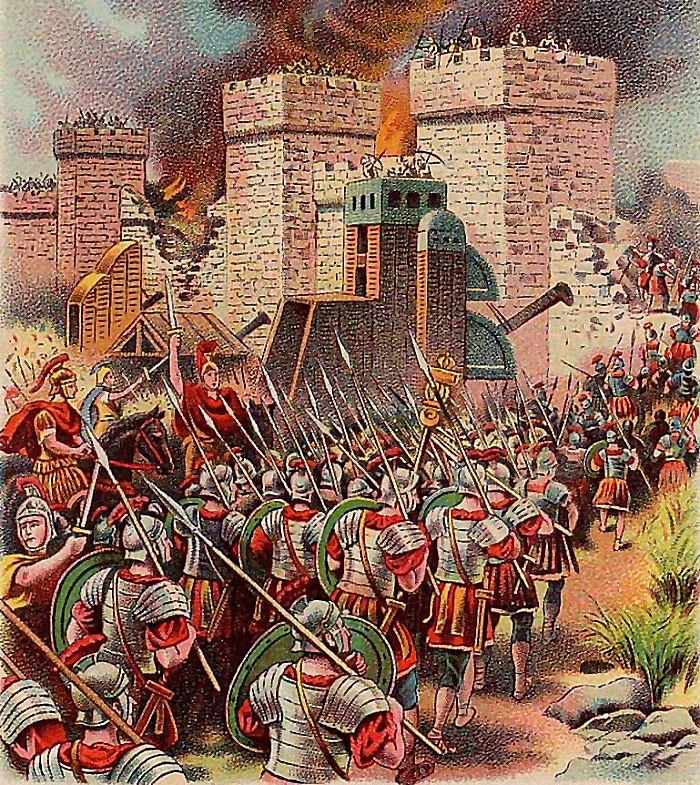
66 AD
Growing anger against increased Roman suppression of Hebrew life resulting in
sporadic violence escalates into a full-scale revolt.
The Roman
governor, Gessius Florus, respondes by plundering the Temple, claiming the
money is for the Emperor.
The next day he launches a raid on the city,
arresting numerous senior Hebrew merchants.
This prompts
a wider, large-scale
rebellion and the Roman military garrison of Judaea is quickly overrun by
the Zealots, while the pro-Roman king Agrippa II, together with Roman
officials, flee Jerusalem.
Confrontation between the
Sadducee Jerusalemites
and the mainly Zealot factions of the Northern Revolt under the command of
Yohanan ben Levi and Simon bar
Kokhba, erupts into bloody violence.
When the Idumeans enter
Jerusalem fighting on the side of the Zealots they kill the former
High Priest,
Ananus ben Ananus - the man who
ordered the execution by stoning of James the brother of
Jesus.
Simon Bar Giora, commanding 15,000 troops, is then invited
into Jerusalem by the remaining
Sadducee leaders to stand
against the Zealots, and quickly takes control over much of the
city.
69 Bitter infighting continues between the
factions of Simon Bar Giora and Yohanan ben Levi and Simon bar
Kokhba.
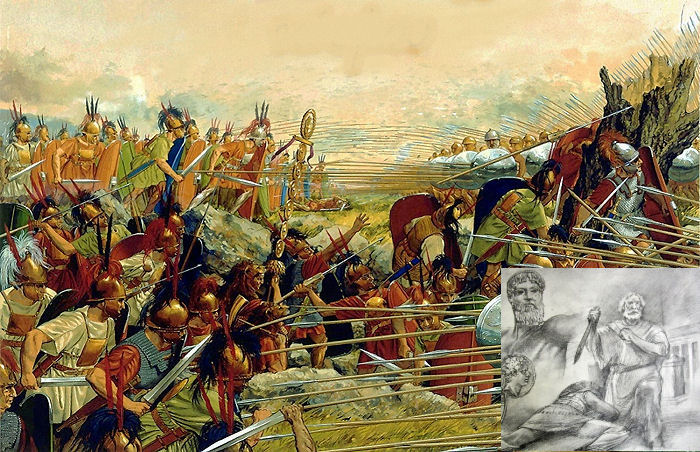
70 Superior Roman forces led by Titus besiege
Jerusalem.
The first two walls of
Jerusalem are breached within three weeks, but
a stubborn rebel standoff
prevents the Roman Army from breaking the third and thickest wall.
Following a brutal seven-month siege, during which Zealot infighting
results in burning of the entire food supplies of the city, the Romans finally
succeed in breaching the defenses of the weakened Hebrew forces.
The
Second Temple is destroyed and
Jerusalem is razed to
the ground.
The Sicarii, a
splinter group of Zealots, act
as assassins, saboteurs and
commanders of the Zealot shock
troops for the Sadducees.
The leader of the Sicarii, Menahem, is
murdered by rival
factions during an
altercation; but promises to return in
physical form to his people before the end of the 2nd fall of mankind right
before his passing from this life.
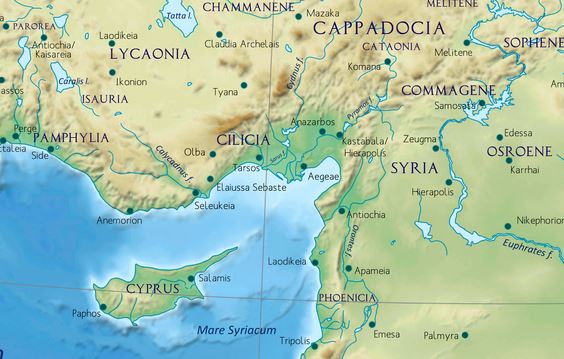

Saul of Tarsus is born of
wealthy Hebrew parents engaged in trade in the first decade of the common era
at Tarsus in Cilicia.
Tarsus - a junction point of land and sea routes
connecting the Cilician plain (today called Çukurova), central Anatolia
and the Mediterranean sea - has long been an important stop for traders and a
focal point of many civilizations for the past 6000 years, much like
Yemen.
There is no indication in Saul's writings
that he received rabbinical training.
Hellenistic literature, the
Book of Wisdom (Sirach) and other Apocrypha were the sources for his
eschatological and theological system.
Saul of Tarsus chose
the Jesus the Tannaim
as the model to provide the fulfillment of the promise of return by the leader
of the Sicarii, Menahem, as his model for
Chrestus.
The spiritual
leader of the Zaddikim, Menahem modeled on the scripture of Melchizedek, is the
one who raises Christ.

The Hebrew word
Zaddikim, defined as "the most perfect righteous Ones" (ZAD-dee-KEEM:
etymology,
Hebrew word Tzaddik = "righteous"), were a
splinter cult of ultra-radical Hellenized Hebrews whose
beliefs and practices are recorded in the Dead Sea Scrolls.
The last
remnants of the Sicarii and the Zaddikim were defeated at the last Hasmonean
dynasty outpost at Masada in 73 AD.
The inner circle of the Hasmonean
dynasty high priests were Zaddikim.
A manuscript with six chapters of
Sirach was found at Masada.
Survivors of the cult of the Zaddikim
following the destruction of Jerusalem in 70 AD fled to Masada,
the fortress hide away
built by Herod on a mountain plateau near the Dead Sea.
Masada is 35
miles from Jerusalem.
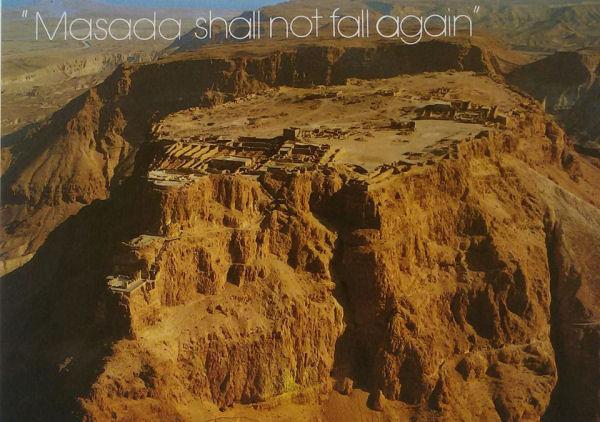
73 AD Masada was first built as a fortress
by a Hasmonean priest Jonathan who was either the brother of Judah Maccabee or
Alexander Janneus.
As the Romans engineer and build a ramp to invade the
plateau the
Zaddikim of the Dead Sea the last
remaining inhabitants become suicidal.
Zaddikim, Sadducee high
priesthood children, make a last stand at Masada.
"Since we long ago
resolved never to be servants to the Romans, nor to any other than to God
Himself, Who alone is the true and just
Lord of Mankind, the time
is now come that obliges us to make that resolution true in practice.
We
were the very first that revolted, and we are the last that fight against them;
and I cannot but esteem it as a favor that God has granted us, that it is still
in our power to die bravely, and in a state of freedom." - Elazar ben Yair,
leader of the Zaddikim
After this oration, the last remnants of the
Hasmonean dynasty, the Zaddikim men, kill their wives, their children, and then
each other.
For over 1750 hundred years the tale of Masada is a
forgotten episode.
1926 Isaac Lamdan pens "Masada," a poetic history of the
anguished Jewish fight against a world full of enemies.
According to
Professor David Roskies, Lamdan's poem, "more than any other text, inspired the
uprising in the Warsaw
Ghetto."
"The Diasporia of Exile was needed in order to
construct a long-range
memory in which an exiled nation race was posited as the direct
continuation of 'people of the Bible' that preceded it." - Professor Shlomo
Sand
1953 Chief of Staff of the Israel Defense
Forces (IDF), Moshe Dayan, initiates the practice of holding the swearing-in
ceremony of Israeli Armoured Corps soldiers who had completed their Tironut
(IDF basic training), on top of Masada.
The ceremony ended with the
declaration: "Masada shall not fall again."
The soldiers climb the
Snake Path at night and are sworn in
with torches lite.
2007 A new museum opens at
Masada in which archeological findings are displayed in a theatrical
setting.
The Zaddikite impulse lives on in the refounding of the
Hasmonean dynasty as the state of Israel with a new title for their reminiscent
ideology, Zionism.
The
psychopathic beliefs of the
Zaddikim infect humanity globally with a
suicidal mania demanding
unattainable perfection disguised as
political-religious
beliefs and perverted
into a War on Nature.
"Whatever laws, customs, or ceremonies we observe -
whether we are Conservative, Reform or merely spasmodic sentimentalists -
we follow the Talmud. It is our common law." -
Herman Wouk Conscription exists in Israel for all
Israeli citizens over the age of 18
who are Jewish, Druze, or
Circassian.
Palestinians are not conscripted.
Reexamining first Israeli_African American soldier
death
Black Hebrews slam IDF after soldier's death ruled
suicide |
|

 |
This web site is not a commercial web site and
is presented for educational purposes only.

This website defines a new
philosophical ideology to which its author adheres. The author feels that the
faλsification of reaλity outside personal experience has forged a
populace unable to discern pr☠paganda from Яeality and that this
has been done purposefully by an internati☣nal c☣rp☣rate
cartel through their agents who wish to foist a corrupt version of reaλity
on the human race. Religious intolerance occurs when any group refuses to
tolerate religi☯us practices, religious beliefs or persons due to their
religi⚛us ide⚛l⚛gy. This web site marks the founding of a
mystery school ªptly nªmed the Mŷsterŷ of the
Lumière Infinie - a ra☨ional gnos☨ic mys☨ery
re☦igion based on reaso🐍 which requires no leap of faith, accepts
no tithes, has no supreme leader, no church buildings and in which each and
every individual is encouraged to develop a pers∞nal relati∞n with
the Æon through the pursuit of the knowλedge of reaλity in the
cu☮ing the spi☮itual co☮☮uption that has enveloped the
human spirit. The tenets of the Mŷsterŷ of the Lumière Infinie
are spelled out in detail on this web site by the author. Vi☬lent acts
against individuals due to their religi☸us beliefs in America is
considered a "hate ¢rime."
This web site in no way condones
violence. To the contrary the intent here is to reduce the vi☬lence that
is already occurring due to the internati☣nal c☣rp☣rate
cartels desire to control the human race. The internati☣nal
c☣rp☣rate cartel already controls the world banking system,
c☸rp☸rate media w☸rldwide, the global industrial military
entertainment complex and is responsible for the coλλapse of
moraλs, the eg● w●rship and the destruction of gl☭bal
ec☭systems. Civilization is based on coöperation. Coöperation
with bi☣hazards at the point of a gun.
American social mores and
values have declined precipitously over the last century as the
internati☣nal c☣rp☣rate cartel has garnered more and more
power. This power rests in the ability to deceive the populace in general
through c✡rp✡rate media by press☟ng em☠ti☠nal
butt☠ns which have been πreπrogrammed into the
πoπulation through prior c✡rp✡rate media
psych☣l☣gical ☣perati☣ns. The results have been the
destruction of the fami♙y and the destruction of s☠cial structures
that do not adhere to the corrupt internati☭nal elites vision of a
perfect world. Through distra¢tion and ¢oer¢ion the direction of
th✡ught of the bulk of the p☠pulati☠n has been directed
toward solutions proposed by the corrupt internati☭nal elite that further
con$olidate$ their p☣wer and which further their purposes.
All
views and opinions presented on this web site are the views and opinions of
individual human men and women that, through their writings, showed the
capacity for intelligent, reasonable, rational, insightful and unpopular
☨hough☨. All factual information presented on this web site is
believed to be true and accurate and is presented as originally presented in
print media which may or may not have originally presented the facts
truthfully. Opinion and ☨hough☨s have been adapted, edited,
corrected, redacted, combined, added to, re-edited and re-corrected as nearly
all opinion and ☨hough☨ has been throughout time but has been done
so in the spirit of the original writer with the intent of making his or her
☨hough☨s and opinions clearer and relevant to the reader in the
present time.
Fair Use Notice

This site may contain
copyrighted material the use of which has not always been specifically
authorized by the copyright owner. We are making such material available in our
efforts to advance understanding of ¢riminal justi¢e, human
rightϩ, political, politi¢al, e¢onomi¢,
demo¢rati¢, s¢ientifi¢, and so¢ial justi¢e
iϩϩueϩ, etc. We believe this constitutes a 'fair use' of any
such copyrighted material as provided for in section 107 of the US Copyright
Law. In accordance with Title 17 U.S.C. Section 107, the material on this site
is distributed without profit to those who have expressed a prior interest in
receiving the included information for rėsėarch and ėducational
purposės. For more information see:
www.law.cornell.edu/uscode/17/107.shtml. If you wish to use copyrighted
material from this site for purposes of your own that go beyond 'fair use', you
must obtain permission from the copyright owner. |
 Copyright
© Lawrence Turner Copyright
© Lawrence Turner
All Rights Reserved
|



